Related Research Articles
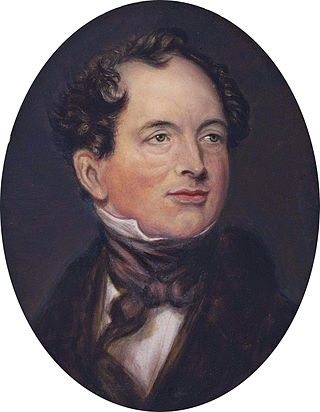
Thomas Moore was an Irish writer, poet, and lyricist celebrated for his Irish Melodies. Their setting of English-language verse to old Irish tunes marked the transition in popular Irish culture from Irish to English. Politically, Moore was recognised in England as a press, or "squib", writer for the aristocratic Whigs; in Ireland he was accounted a Catholic patriot.
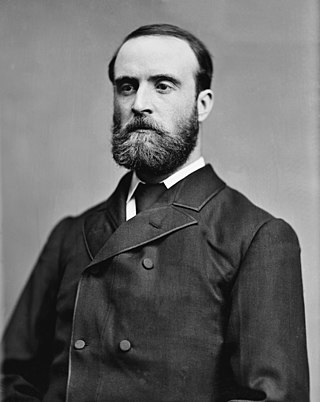
Charles Stewart Parnell was an Irish nationalist politician who served as a Member of Parliament (MP) from 1875 to 1891, also acting as Leader of the Home Rule League from 1880 to 1882 and then Leader of the Irish Parliamentary Party from 1882 to 1891. His party held the balance of power in the House of Commons during the Home Rule debates of 1885–1886.
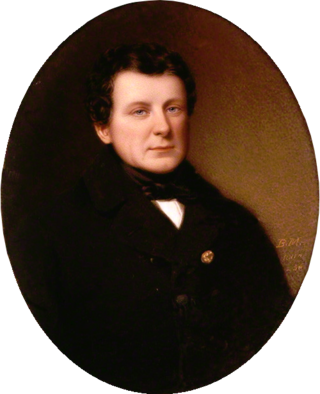
Daniel O'Connell (I), hailed in his time as The Liberator, was the acknowledged political leader of Ireland's Roman Catholic majority in the first half of the 19th century. His mobilization of Catholic Ireland, down to the poorest class of tenant farmers, secured the final installment of Catholic emancipation in 1829 and allowed him to take a seat in the United Kingdom Parliament to which he had been twice elected.
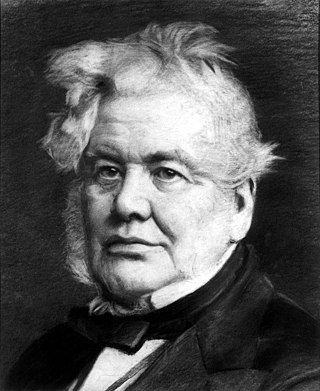
Isaac Butt was an Irish barrister, editor, politician, Member of Parliament in the House of Commons of the United Kingdom, economist and the founder and first leader of a number of Irish nationalist parties and organisations. He was a leader in the Irish Metropolitan Conservative Society in 1836, the Home Government Association in 1870, and the Home Rule League in 1873. Colin W. Reid argues that Home Rule was the mechanism Butt proposed to bind Ireland to Great Britain. It would end the ambiguities of the Act of Union of 1800. He portrayed a federalised United Kingdom, which would have weakened Irish exceptionalism within a broader British context. Butt was representative of a constructive national unionism. As an economist, he made significant contributions regarding the potential resource mobilisation and distribution aspects of protection, and analysed deficiencies in the Irish economy such as sparse employment, low productivity, and misallocation of land. He dissented from the established Ricardian theories and favoured some welfare state concepts. As editor he made the Dublin University Magazine a leading Irish journal of politics and literature.

John Charles Spencer, 3rd Earl Spencer,, styled Viscount Althorp from 1783 to 1834, was a British statesman. He was Chancellor of the Exchequer under Lord Grey and Lord Melbourne from 1830 to 1834. Due to his reputation for integrity, he was nicknamed "Honest Jack".

Charles Wood, 1st Viscount Halifax, known as Sir Charles Wood, 3rd Baronet, between 1846 and 1866, was a British Whig politician and Member of the British Parliament. He served as Chancellor of the Exchequer from 1846 to 1852.

Thomas Spring Rice, 1st Baron Monteagle of Brandon, was a British Whig politician, who served as Chancellor of the Exchequer from 1835 to 1839.

Francis Blackburne PC (Ire) KS was an Irish judge and eventually became Lord Chancellor of Ireland.

William Conyngham Plunket, 1st Baron Plunket, PC (Ire), QC was an Irish politician and lawyer. After gaining public notoriety as the prosecutor in the treason trial of Robert Emmet in 1803, he rose rapidly in government service. He become Lord Chancellor of Ireland in 1830 and served, with a brief interruption, in that post until his retirement in 1841.

Portrane or Portraine is a small seaside settlement, three kilometres from,the small town of Donabate in Fingal, Ireland. It lies in the Barony of Nethercross, in the historic County Dublin.
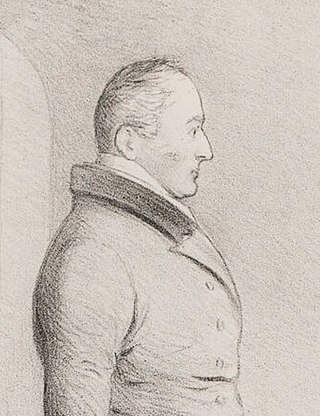
Henry Brooke Parnell, 1st Baron Congleton PC, known as Sir Henry Parnell, Bt, from 1812 to 1841, was an Irish writer and Whig politician. He was a member of the Whig administrations headed by Lord Grey and Lord Melbourne of the 1830s and also published works on financial and penal questions as well as on civil engineering. He was a grand-uncle to the Irish nationalist leader Charles Stewart Parnell.

The 1830 United Kingdom general election was triggered by the death of King George IV and produced the first parliament of the reign of his successor, William IV. Fought in the aftermath of the Swing Riots, it saw electoral reform become a major election issue. Polling took place in July and August and the Tories won a plurality over the Whigs, but division among Tory MPs allowed Earl Grey to form an effective government and take the question of electoral reform to the country the following year.
Sir Joseph Napier, 1st Baronet was an Irish Conservative Party Member of Parliament (MP) in the United Kingdom Parliament. He was also a barrister and judge, who served briefly as Lord Chancellor of Ireland.

Protestant Irish Republicans Nationalists are adherents of Protestantism in Ireland who also support Irish nationalism. Protestants have played a large role in the development of Irish nationalism since the eighteenth century, despite most Irish nationalists historically being from the Irish Catholic majority, as well as most Irish Protestants usually tending toward unionism in Ireland. Protestant nationalists have consistently been influential supporters and leaders of various movements for the political independence of Ireland from Great Britain. Historically, these movements ranged from supporting the legislative independence of the Parliament of the Kingdom of Ireland, to a form of home rule within the United Kingdom of Great Britain and Ireland, to complete independence in an Irish Republic and a United Ireland.
The Parnell Commission, officially Special Commission on Parnellism and Crime, was a judicial inquiry in the late 1880s into allegations of crimes by Irish parliamentarian Charles Stewart Parnell which resulted in his vindication.
The Irish Conservative Party, often called the Irish Tories, was one of the dominant Irish political parties in Ireland in the 19th century. It was affiliated with the Conservative Party in Great Britain. Throughout much of the century it and the Irish Liberal Party were rivals for electoral dominance among Ireland's small electorate within the United Kingdom of Great Britain and Ireland, with parties such as the movements of Daniel O'Connell and later the Independent Irish Party relegated into third place. The Irish Conservatives became the principal element of the Irish Unionist Alliance following the alliance's foundation in 1891.
Events from the year 1884 in Ireland.

Thomas Manners-Sutton, 1st Baron Manners, was a British lawyer and politician who served as Lord Chancellor of Ireland from 1807 to 1827.
George Evans, 1st Baron Carbery PC (Ire) was an Irish politician and peer. A member of a County Limerick family of Whigs, he entered the Irish House of Commons and was created a peer in 1715 as a reward for his father's support of the Hanoverian succession, after his father declined the offer. At the same time, he was returned to the British House of Commons for Westbury. He contested control of the borough with the Tories led by the Earl of Abingdon until 1727, when he stood down.
Sir John Gray JP, sometimes spelt John Grey, was an Irish physician, surgeon, newspaper proprietor, journalist and politician. Gray was active both in municipal and national government for much of his life, and had nationalist ideals – which he expressed as owner of the Freeman's Journal, chairman of the Dublin Corporation Water Works Committee between 1863 and 1875, and Member of Parliament in the House of Commons of the United Kingdom of Great Britain and Ireland for Kilkenny city from 1865 until his death. He was a supporter of Daniel O'Connell, and later of Charles Stewart Parnell, and advocated a repeal of the Act of Union. Through his offices with Dublin Corporation, the Vartry Reservoir water supply works were completed, introducing a freshwater supply to Dublin city and suburbs. He died at Bath in England on 9 April 1875. Shortly after his death, his contributions to the provision of the water supply, and the beneficial impact this had to conditions of public health in Dublin, were recognised in a memorial statue on O'Connell Street.
References
- ↑ Lundy, Darryl (22 December 2007). "Captain Hampden Evans".[ unreliable source ]
- 1 2 Burke, John; Burke, John Bernard (1847). Burke's genealogical and heraldic history of the landed gentry, Volume 1. London: Henry Coulburn. p. 384. Retrieved 12 June 2010.
- ↑ Belfast Newsletter . 21 June 1834.
{{cite news}}: Missing or empty|title=(help) - ↑ "Anti-Tory Association". Belfast Newsletter . 28 November 1834.
- 1 2 3 "Death of the Right Hon. George Evans". Freeman's Journal . 4 July 1842.
- ↑ "Death of the Right Hon. G. Evans". Morning Chronicle . 6 July 1842.
- ↑ "Portrane tower heads for 160th birthday". Fingal Independent. 12 September 2003.